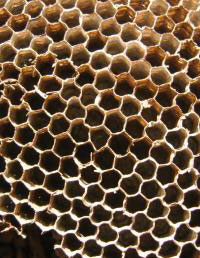Clinical
Specialties: Apitherapy
Propolis

Propolis has been used medicinally for its antiseptic, antimicrobial, and detoxifying properties for centuries. Many cultures have relied on it to heal a wide variety of wounds. Propolis, also known as “Russian penicillin" or "bee glue", is a sticky substance that bees make from tree resins. Bees keep their hive sterile by coating the inside of the hive with it, preventing the spread of bacteria and fungi that would be detrimental to the well being of the colony. Propolis from different regions exhibit slightly different properties depending on the types of tree and plant resins available in the area. All propolis includes multiple bioflavinoids.
In many countries where antibiotics are not widely available, it is a common practice to wash, gargle, or irrigate with propolis. Used as an antiseptic, propolis is able to prevent the growth of bacteria and also promote the healing process. Propolis is also commonly taken as a remedy for sore throats. It is used topically in salves for cuts, burns and lesions of the skin that have not healed. Used as a mouthwash, propolis is able to prevent bad breath, gingivitis, tooth decay and gum disease. It contains flavonoid compounds known for their antioxidant activity as well as tissue strengthening and regenerative effects. A 1994 study performed in Poland demonstrated the strong anti-aging effects of propolis when mice given propolis were found to live longer than a control group.
Propolis is capable of acting as an anti-inflammatory as well. It helps with arthritis, boils, acne, asthma, dermatitis, ulcers, and inflammatory bowel diseases. Propolis has also been found to have antimutagenic effects too, which can aid in the prevention of cancer, and can also ameliorate the side effects of chemo and radiation therapies especially when given with royal jelly.
|
